WARFARIN - ORAL
PHONETIC PRONUNCIATION: (WARF-uh-rin)
COMMON BRAND NAME(S): Coumadin, Jantoven
GENERIC NAME(S): warfarin sodium
Uses
USES: This medication is used to treat blood clots (such as in deep vein thrombosis-DVT or pulmonary embolus-PE) and/or to prevent new clots from forming in your body. Preventing harmful blood clots helps to reduce the risk of a stroke or heart attack. Conditions that increase your risk of developing blood clots include a certain type of irregular heart rhythm (atrial fibrillation), heart valve replacement, recent heart attack, and certain surgeries (such as hip/knee replacement). Warfarin is commonly called a "blood thinner," but the more correct term is "anticoagulant." It helps to keep blood flowing smoothly in your body by decreasing the amount of certain substances (clotting proteins) in your blood.
How to use WARFARIN - ORAL
HOW TO USE: Read the Medication Guide provided by your pharmacist before you start taking warfarin and each time you get a refill. If you have any questions, ask your doctor or pharmacist. Take this medication by mouth with or without food as directed by your doctor or other health care professional, usually once a day. It is very important to take it exactly as directed. Do not increase the dose, take it more frequently, or stop using it unless directed by your doctor. Dosage is based on your medical condition, laboratory tests (such as INR), and response to treatment. Your doctor or other health care provider will monitor you closely while you are taking this medication to determine the right dose for you. Use this medication regularly to get the most benefit from it. To help you remember, take it at the same time each day. It is important to eat a balanced, consistent diet while taking warfarin. Some foods can affect how warfarin works in your body and may affect your treatment and dose. Avoid sudden large increases or decreases in your intake of foods high in vitamin K (such as broccoli, cauliflower, cabbage, brussels sprouts, kale, spinach, and other green leafy vegetables, liver, green tea, certain vitamin supplements). If you are trying to lose weight, check with your doctor before you try to go on a diet. Since this drug can be absorbed through the skin and lungs and may harm an unborn baby, women who are pregnant or who may become pregnant should not handle this medication or breathe the dust from the tablets.
Side Effects
Precautions
Interactions
Overdose
Images
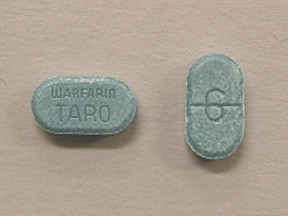
- color
- teal
- shape
- oblong
- imprint
- 6, WARFARIN TARO

- color
- teal
- shape
- oblong
- imprint
- 6, WARFARIN TARO
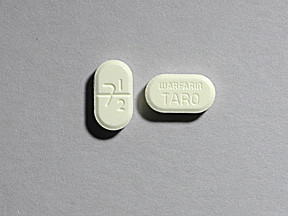
- color
- yellow
- shape
- oblong
- imprint
- 7.5, WARFARIN TARO

- color
- yellow
- shape
- oblong
- imprint
- 7.5, WARFARIN TARO
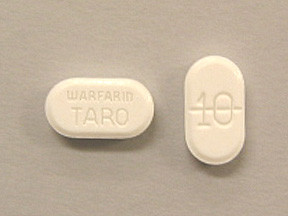
- color
- white
- shape
- oblong
- imprint
- 10, WARFARIN TARO

- color
- white
- shape
- oblong
- imprint
- 10, WARFARIN TARO
Reviews
Faq for WARFARIN - ORAL
Warfarin is a type of blood thinner that is used to prevent blood clots and reduce the risk of stroke, heart attack, and other serious medical conditions in people with certain conditions such as atrial fibrillation, deep vein thrombosis, or pulmonary embolism.
Warfarin works by reducing the formation of blood clots in the body. It does this by interfering with the normal clotting process. It inhibits the action of vitamin K, which is necessary for the production of certain clotting factors in the blood.
Common side effects of warfarin include easy bruising, bleeding gums, nosebleeds, heavy menstrual bleeding, and prolonged bleeding from cuts. Some people may also experience stomach pain, bloating, diarrhea, or hair loss. If you experience any unusual or severe side effects, it is important to contact your doctor.
Warfarin is typically taken once a day, usually in the evening, with or without food. It is important to take it exactly as prescribed by your doctor and to follow their instructions carefully. Regular monitoring of your blood clotting levels (INR) will also be necessary to ensure that you are taking the correct dosage.
Warfarin can interact with certain foods that are high in vitamin K, which can affect its effectiveness. Foods that are high in vitamin K include leafy green vegetables, such as kale, spinach, and broccoli, as well as liver and some vegetable oils. It is important to maintain a consistent intake of foods high in vitamin K and to discuss any significant changes in your diet with your doctor.
Yes, there are several medications that can interact with warfarin and either increase or decrease its effectiveness. Some common examples include nonsteroidal anti-inflammatory drugs (NSAIDs), antibiotics, certain antidepressants, and antacids. It is important to inform your doctor about all the medications, including over-the-counter drugs and supplements, that you are taking to avoid potential interactions.
It is generally recommended to limit alcohol intake while taking warfarin. Alcohol can increase the risk of bleeding, and some studies suggest that excessive alcohol consumption can interfere with the effectiveness of warfarin. It is best to consult with your doctor to determine if moderate alcohol consumption is safe for you.
If you miss a dose of warfarin, take it as soon as you remember, unless it is close to the time for your next dose. Do not take a double dose to make up for a missed one. If you are unsure about what to do, contact your doctor or pharmacist for guidance.
The length of treatment with warfarin depends on the individual and their specific medical condition. Some people may need to take warfarin for a few months, while others may need to take it on a long-term basis. Your doctor will determine the duration of treatment based on your risk factors and medical history.
Warning
WARNING: Warfarin can cause very serious (possibly fatal) bleeding. This is more likely to occur when you first start taking this medication or if you take too much warfarin. To decrease your risk for bleeding, your doctor or other health care provider will monitor you closely and check your lab results (INR test) to make sure you are not taking too much warfarin. Keep all medical and laboratory appointments. Tell your doctor right away if you notice any signs of serious bleeding. See also Side Effects section.
Disclaimer
IMPORTANT: HOW TO USE THIS INFORMATION: This is a summary and does NOT have all possible information about this product. This information does not assure that this product is safe, effective, or appropriate for you. This information is not individual medical advice and does not substitute for the advice of your health care professional. Always ask your health care professional for complete information about this product and your specific health needs.
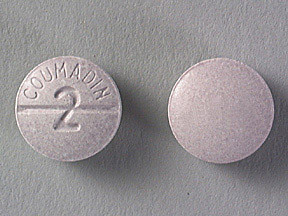
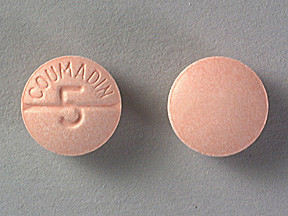
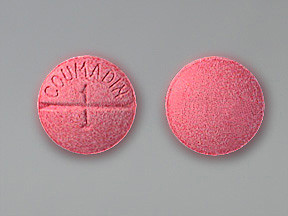
No Reviews Yet